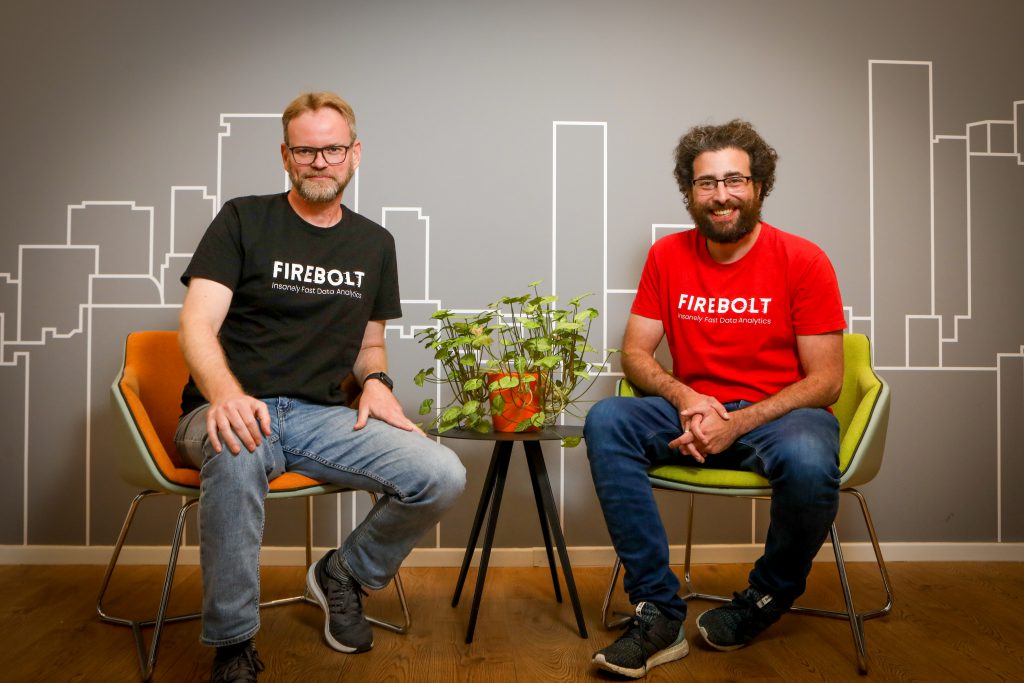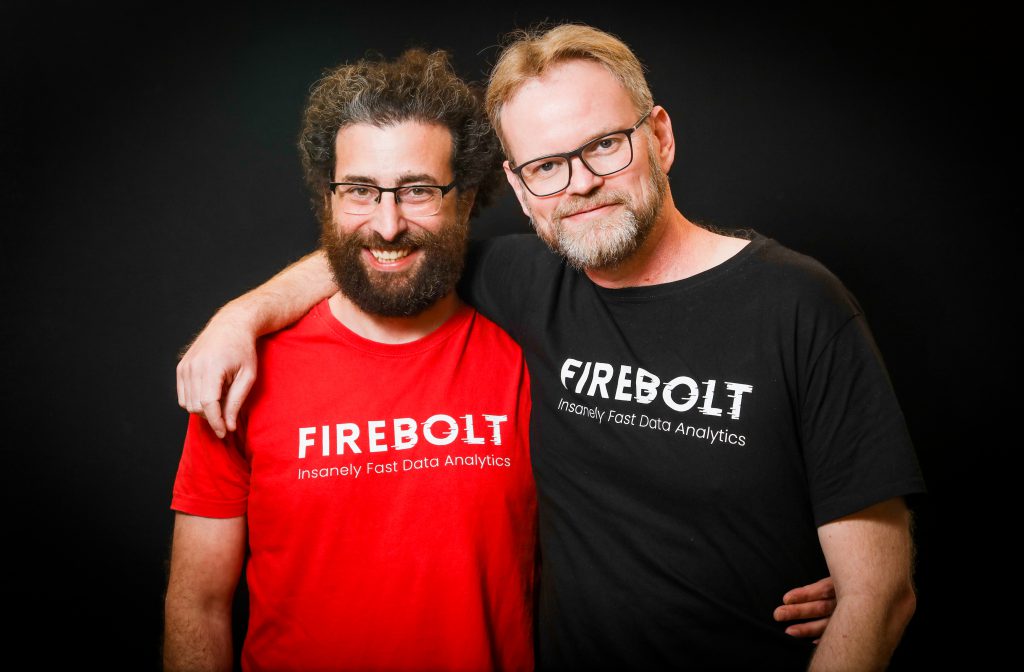Total fundraising: $37 million
Employees: 85 employees
Founders: Saar Bitner and Eldad Farkash
Founded: 2018
Investors: Bessemer Venture Partners, TLV Partners, Zeev Ventures and Angular Ventures.
“There is a need for speed,” say Eldad Farkash and Saar Bitner, founders of the promising start-up Firebolt.The technology that they developed enables their users — primarily engineers and developers — to carry out analysis, at peak speed, for huge amounts of data — terabytes and sometimes petabytes (millions of gigabytes) of information.
Here too lies the great potential of the small company. After all, in the world of big data, efficiency and speed are the name of the game. Just think what would happen if, for example, the Google search engine took full minutes or even hours to deliver results.
The accelerated digitization of information has sent vast amounts of data to the cloud. The size of the digital universe, the total amount of information that exists in the cybernetic world, is currently estimated at some 44 zettabytes, or 44 trillion gigabytes — if you’re still following. And that is just the tip of the iceberg. The extensive digital cosmos is growing at an exponential rate, doubling its size every two years.
At the same time as this enormous growth, the challenge of fast and efficient use of data has risen too, and the lack of effective tools for analyzing large amounts of data in a reasonable time becomes apparent. This is the reason that only a fraction of the information in the digital universe (only about 1%) is/has been analyzed today.
“We see it all the time,” Bitner says, from his point of view as VP of Firebolt’s operations. “Companies that want to analyze huge amounts of information ultimately have to make do with just a small fraction of it. The amounts of information here are enormous and they are no tools good enough for quick and efficient analysis. This is where Firebolt enters the picture.

“It’s a snowball effect. Consumption of data generates further data which creates increased consumption,” describes Farkash, the CEO, “Today we see more and more transitions to big data, which until now was concentrated among the big companies, but is becoming much more decentralized and spread out. Everything is built on it. This is the great need and the considerable challenge… and this is exactly where Firebolt finds itself.”
Through developing a cloud data warehouse, Firebolt’s algorithm can analyze huge amounts of information very quickly — up to a hundred times faster than competitors, according to the company’s claim. The innovative architecture that Firebolt developed which separates the layer in which the data is stored from the layer in which it is processed, integrates fast information-processing technologies along with a high volume of data lakes on the cloud. This way queries can be run at very high speeds with a minimum of resources.
The big leagues
It’s enough to look around the arena in which Firebolt is positioned to note the giants they are up against. On the one hand this illustrates the tremendous challenge before them, but also the phenomenal potential in the product that they have developed. Those who dominate the field these days are the cloud vendors of the technology giants, the service providers of Amazon (AWS/Amazon Web Services), Microsoft (Azure) or Google (Google Cloud). These companies currently have a firm grip on both ends of the transaction — they sell the “hardware” on which the information is stored and then they sell the “software” which allows them to access, process and analyze it.
But Farkash and Bitner are not intimidated by their competitors. On the contrary, it seems that they are very sure of their ability to stand out in the field and beat the big guys. “Firebolt has a competitive product in this category, with new and different technology, which has come to break the consumer model which says that if you need more you pay more,” Farkash explains. “We want to shock this market and start offering alternatives — and there will be others like us,” he promises, “This whole field will be shaken up in the coming years.”
One such company which already “shook” this industry hard is SnowFlake, the data storage company which went head-to-head with the giants and plays on the same field as Firebolt. SnowFlake went public last September in an offering that was crowned as “the biggest software IPO in history” and “one of the five largest American technology IPOs.” Today the company has a market value of $70 billion after rising to a value of over $110 billion at the end of 2020.
“We are still the mouse walking beside the elephant and saying look how much dust we make together,” Farkash demurs. But he knows full well that the company that he founded — even if in practice it is aimed at a slightly different area of expertise than SnowFlake — is well-positioned in the same focus area. “Our model is built on the fact that the need to put big data to use is exploding and with it the need to dramatically improve its speed,” he says, “and Firebolt is the meeting point between speed and efficiency.”

Little blip
Today, speed and efficiency cost money. A ride on the Firebolt “train” should save users lots of resources of energy (processing power) and time — which translates into significant savings for companies and a steady increase in product demand. These benefits are plenty evident in the pace of the company’s expansion. Firebolt currently has some 70 employees, most of them engineers spread out all over the world. Last September there was a soft launch of the product and in December it was officially inaugurated and already reported dozens of paying customers and accelerated increase in sales.
Plenty of investors have also identified the great potential and have been quick to shower the developers with money — all just to make it possible for them to fulfill their great promise. In the marketplace it seems that the data company has already been marked as a gosling which will one day become a goose that lays golden eggs.
Also the proven record of the innovators and founders, who worked together at a start-up which already became a great success — adds to the buzz surrounding the company. Eldad Farkash and Saar Bitner were on the founding team of Sisense, a data company which developed an AI platform for analyzing organizational data and became a unicorn this year after raising $100 million, earning it a valuation of 1.1 billion dollars. Farkash left Sisense a few years ago in order to develop the big idea that was ripening in his mind. He eagerly courted Bitner until he was convinced and the two joined forces to found Firebolt.
It seems that the two of them don’t regret their decision for a moment and aren’t stopping to look back. Only last December, they announced fundraising of $37 million — out of a total $42 million that the young company raised since its founding three years ago — and if one had to bet, it almost certainly won’t be the last round of funding/fundraising. The next round may well be the one that grants them the official title of unicorn.
But right now that is not what occupies them particularly.They see the unicorn status as just another station on a long road to the top — turning Firebolt into a giant: influential and dominant. “The goal is to be the most essential in the future of data. We believe that a big part of this lies in how the data is processed. Just as they invented the router which allowed us to route traffic more intelligently,” says Farkash.

It is clear why they don’t even want to hear about a quick exit. For them the end goal is to become a major, significant player in the field. “The days of Israeli entrepreneurs just looking to make an exit are over. That is behind us. That story is over,” Farkash says with characteristic certainty. “Our market has evolved and matured and companies today are not built for a quick exit.”
To this end, an IPO is certainly a necessary step, but even this stage is, in their view, just another step in a long, ongoing process. “Does anyone remember when Facebook had an IPO? When the best companies went public? Nobody remembers,” says Farkash emphatically. “In the history of companies which grew and turned big, the IPO was just another stage in the process of maturation — a little blip in their development, and on their way to becoming huge companies.”
For them the goal is very clear and they do not intend to waste this opportunity that fell into their laps — to build a successful company, to recruit the best talent as fast as they can and make an impact ASAP.
“We live in gold rush times and what this crazy period makes possible is thinking big,” Farkash concludes. “You can see it everywhere — companies grow quickly and big ideas come to life. It is exactly the right time to think big and we are in exactly the right place — in the eye of the ‘perfect storm.’ We had other plans in the past, but when the storm comes and carries you where it carries you — that is where you are and in the meantime it’s a great journey.”





